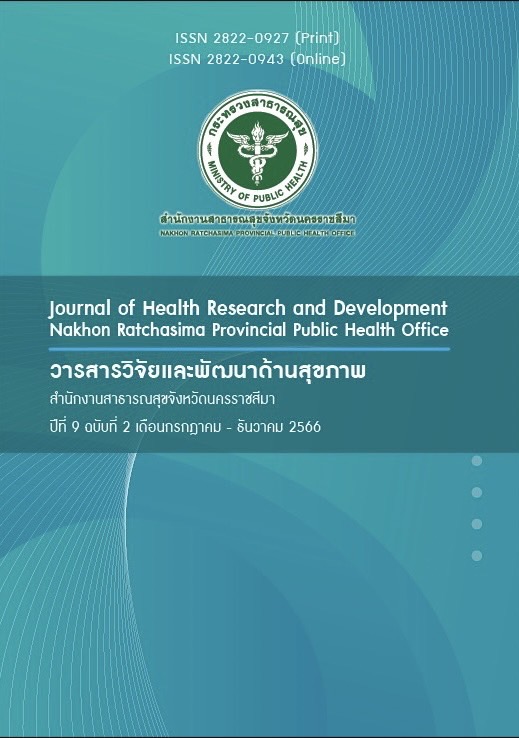สภาพปัญหาการเลี้ยงลูกด้วยนมแม่ของแม่หลังคลอดในโรงพยาบาลช่วงโควิดในประเทศไทย : การวิจัยเชิงคุณภาพแบบบรรยาย
คำสำคัญ:
ปัญหาการเลี้ยงลูกด้วยนมแม่, แม่หลังคลอด, โรคโควิด 19, ประเทศไทย, การวิจัยเชิงคุณภาพแบบบรรยายบทคัดย่อ
นมแม่เป็นสิ่งสำคัญสำหรับทารกตั้งแต่แรกเกิดไปจนถึง 6 เดือนแรกและให้ต่อเนื่องถึง 2 ปีในประเทศไทย พ.ศ. 2562 และ 2565 มีรายงาน การเลี้ยงลูกด้วยนมแม่อย่างเดียว 6 เดือนแรก ร้อยละ 14 และ 29 ตามลำดับ ในช่วงสถานการณ์ การระบาดของโควิด 19 ในประเทศไทย ระบบบริการในโรงพยาบาลเปลี่ยนแปลงคือ การกำหนดเวลา การเยี่ยมของญาติและงดการเฝ้าของสมาชิกในครอบครัว จึงเป็นประเด็นที่น่าสนใจว่ามารดาหลังคลอดมีปัญหาอย่างไรบ้างในระหว่างที่อยู่ในโรงพยาบาลระดับทุติยภูมิ วัตถุประสงค์ เพื่อศึกษาสภาพปัญหาการเลี้ยงลูกด้วยนมแม่ของแม่หลังคลอดในโรงพยาบาลระดับทุติยภูมิแห่งหนึ่งในภาคตะวันออกเฉียงเหนือ ของประเทศไทย เป็น การวิจัยเชิงคุณภาพแบบบรรยาย เก็บรวบรวมข้อมูลเดือนกุมภาพันธ์ 2565 ด้วยการสัมภาษณ์เชิงลึกการสังเกตอย่างมีส่วนร่วม การจดบันทึกภาคสนามและการบันทึกภาพ การวิเคราะห์ข้อมูลใช้วิธีวิเคราะห์เนื้อหา
ผลการวิจัย พบว่า ผู้ให้ข้อมูลเป็นมารดาหลังคลอด 28 คน อายุ 18 – 38 ปีอายุเฉลี่ย 28 ปี พบปัญหามี 3 ประเด็นหลัก ได้แก่ (1) การต้องแยกห่างจากสมาชิกในครอบครัว (2) การพึ่งพาพยาบาลดุจดังบุคคลในครอบครัว ประเด็นย่อย (2.1) การสนับสนุนให้มารดาหลังคลอดเริ่มต้นการเลี้ยงลูกด้วยนมแม่ (2.2) ความคงอยู่เพื่อการเลี้ยงลูกด้วยนมแม่อย่างต่อเนื่อง และ (3) การดูแลตนเองเพื่อประสบความสำเร็จในการเลี้ยงลูกด้วยนมแม่ ประเด็นย่อย (3.1) การจัดท่าอุ้มลูกของแม่เพื่อให้นมลูก (3.2) การจัดท่าของลูกเพื่อดูดนมแม่ ข้อเสนอแนะ เป็นข้อมูลสำหรับพยาบาล พยาบาลผดุงครรภ์และวิชาชีพด้านสุขภาพใช้ในการวิจัย การพัฒนาปฏิบัติการพยาบาลและเป็นหลักฐาน เชิงประจักษ์เพื่อการพัฒนาโปรแกรมการดูแลสุขภาพของแม่หลังคลอด
เอกสารอ้างอิง
World Health Organization (WHO). What is the WHO goal for exclusive breastfeeding by 2025?. [Online]. (2023). [cited 2023 September 9]. Available from: http://www.who.int/news-room/facts-in-pictures/breastfeeding
National Statistical Office of Thailand 2023. Thailand Multiple Indicator Cluster Survey 2022, Survey Finding Report. Bangkok, Thailand: National Statistical Office of Thailand; 2022.
Mahasarakham Hospital, Mahasarakham Province, Thailand. Statistic reports postpartum ward 2021. Statistic reports postpartum ward, Mahasarakham Hospital, Mahasarakham Province; 2021.
Nannika V, Panrat S, Nantiya W, Supinda R, Sudaporn P, Chantika C, et al. Breastfeeding. 7th ed. Bangkok: Pre-One Limited Partnership; 2014.
Nittaya S, Sasitara N, Pharuhas C. Factor predicting 6-month-exclusive breastfeeding in mothers with cesarean section. Journal of Nursing Science 2017; 35(1): 14 – 22.
Wanphen R, Tatirat T, Piriya S. Factors predicting exclusive breastfeeding intention for 6 months among working mothers in the industry. The Journal of Faculty of Nursing Burapha University 2020; 28(3): 66 – 78. (in Thai).
Mayura R, Waratip K. The study of factors predicting the duration of exclusive breastfeeding in adolescent mother who attended service at Health Promotion Hospital in Ubonratchathani Province. Journal of Nursing and Health Care 2019; 37(1): 195 – 20. (in Thai).
Ing-hathai D, Sasikarn K. Factors influencing the success of a 6-month exclusive breastfeeding period among working mothers. The Southern College Network Journal of Nursing and Public Health 2021; 9(1): 107 – 20. (in Thai).
Usanee J, Tiamsorn T, Lawan S. Factors associated with the duration of exclusive breastfeeding among postpartum mothers. Nursing Journal 2014; 41(1): 133 – 44. (in Thai).
Pawin P, Khomkrit I, Sirinuch C, Oraporn D. Clinical practice of breastfeeding. Nonthaburi: Beyond Enterprise Company Limited; 2016. (in Thai).
Pravina P, Amornrat P. Knowledge management on promoting breastfeeding among teenage mothers with family participation. Academic Journal of Mahasarakham Provinda Public Health Office 2017; 2(3): 146 – 53.
Aranya T, Kochaporn S, Umaporn K, Jaruwan K. Intention and barriers to breastfeeding among adolescent primiparous mothers. Research and Development Health System Journal 2020; 13(2): 634 – 40. (in Thai).
Srikiat A, Nareelux S. Breastfeeding Sages’ Lived experiences for breastfeeding promotion. Journal of Nursing and Health Care 2017; 35(1): 82 – 90. (in Thai).
Pavarit A, Patiwech S, Parichat P, Phathamon J, Wannaporn A, Raweewat B, Amonrat R, Varisra L. Breastfeeding practice knowledge of mothers who delivered at Srinagarind Hospital 2013; 28(2); 163 – 69. (in Thai).
Munball PL, Boyd CO, Mariano C, Beauchamp CJ. Nursing research: A qualitative perspective (2nd ed.) New York: National League for Nursing press; 1993.
Turale S. A brief introduction to qualitative descriptive: a research design worth using. Pacific Rim International Journal of Nursing Research 2020; 24(3): 289 – 91.
Creswell JM. Qualitative inquiry and research design: choosing among five approaches. Thousand Oaks: Sage; 2007.
Lincoln Ys, Guba EG. Naturalistic inquiry. Newbury Park CA: Sage; 1985.
Chulalak, k., Khwanjai, R, Titaree, P. Promoting breastfeeding during the COVID-19 pandemic. Thai Red Cross Nursing Journal 2022; 14(2): 50 – 62. (in Thai).
Thongbai, N. Effect of implementing breast feeding promotion guideline among postpartum mothers, Fang Hospital, Chiangmai Province. Journal of the Phrase Hospital 2019; 27(1) : 25 – 37. (in Thai).
Giyawati Yulilania, O. & Wahyu, R. Breastfeeding experience during COVID 19 pandemic in Indonesia: Strengthening and weakening elements. Malays Journal medical Science 2022; 29(3): 110 – 21.
Amy, B. & Natalie, S. Experience of breastfeeding during COVID 19: Lessons for future practical and emotional support. Maternal & Child Nutrition 2021; 17(1): 1 – 15.
ดาวน์โหลด
เผยแพร่แล้ว
รูปแบบการอ้างอิง
ฉบับ
ประเภทบทความ
สัญญาอนุญาต
ลิขสิทธิ์ (c) 2024 สำนักงานสาธารณสุขจังหวัดนครราชสีมา

อนุญาตภายใต้เงื่อนไข Creative Commons Attribution-NonCommercial-NoDerivatives 4.0 International License.
บทความที่ได้รับการตีพิมพ์เป็นลิขสิทธิ์ของสำนักงานสาธารณสุขจังหวัดนครราชสีมา กระทรวงสาธารณสุข
ข้อความที่ปรากฏในบทความแต่ละเรื่องในวารสารวิชาการเล่มนี้เป็นความคิดเห็นส่วนตัวของผู้เขียนแต่ละท่านไม่เกี่ยวข้องกับสำนักงานสาธารณสุขจังหวัดนครราชสีมา และบุคลากรท่านอื่นๆในสำนักงานฯ แต่อย่างใด ความรับผิดชอบองค์ประกอบทั้งหมดของบทความแต่ละเรื่องเป็นของผู้เขียนแต่ละท่าน หากมีความผิดพลาดใดๆ ผู้เขียนแต่ละท่านจะรับผิดชอบบทความของตนเองแต่ผู้เดียว



